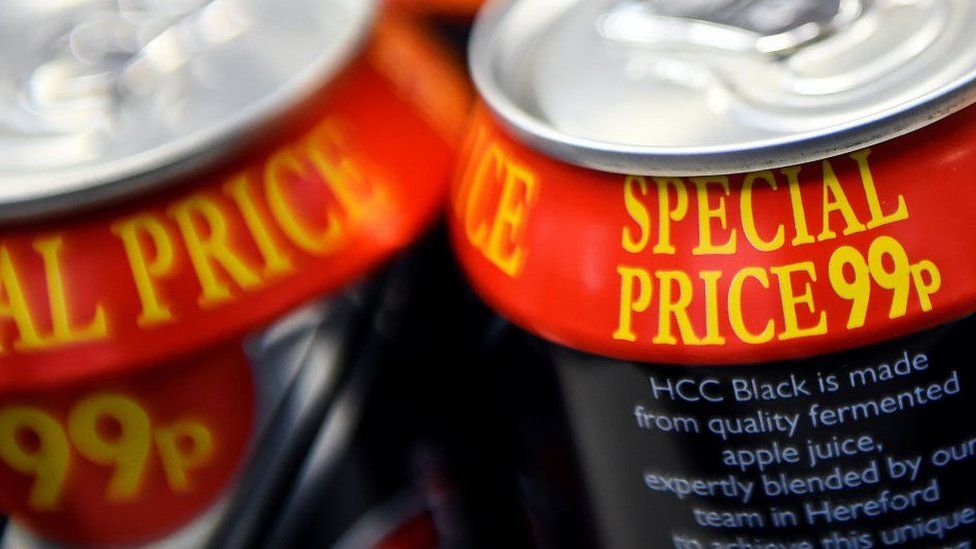ARTICLE AD BOX
 Image source, Getty Images
Image source, Getty Images
Cider and own brand spirits saw some of the biggest price increases after the policy was introduced
The Scottish government is to consult on a proposal to raise the minimum unit price of alcohol to 65p.
A 50p minimum price per unit was introduced in 2018, but that legislation will expire in April 2024.
Drugs Policy Minister Elena Whitham said future proposals would strike a "reasonable balance" between health benefits and the effects on business.
It comes as university research suggested the policy had become less effective because of inflation.
The University of Sheffield report said the original 50p price was now equivalent to 41p.
It also said heavier drinkers increased their alcohol consumption during the Covid pandemic, further cancelling out some of the beneficial impacts.
The Scottish Conservatives said increasing to 65p "would only hit responsible drinkers during a cost-of-living crisis" and called for the government to instead back its proposed Right to Recovery Bill that would guarantee people access to treatment.
The party's health spokesman, Dr Sandesh Gulhane, said: "Alcohol deaths are at their highest level since 2008 on the SNP's watch and it is clear their blanket approach to tackling this crisis is simply not working, or supporting those who most need help with alcohol addiction."
The alcoholic drinks industry was consulted over the summer on the possibility of increasing minimum unit pricing (MUP).
At the time the Federation of Independent Retailers expressed concerns over raising the price to more than 80p, which it described as "over the top".
In a foreword to the government consultation paper Ms Whitham said the proposal for a rise to 65p was built on research into the effectiveness of the policy.
She said: "It is estimated to have cut alcohol consumption, alcohol-attributable deaths and likely to have reduced hospital admissions compared to if the policy didn't exist.
"There was also no clear evidence of substantial negative impacts of the policy on the alcoholic drinks industry, or of social harms at the population level."
However, she accepted that it was only part of the solution, and that support including treatment was needed for problem drinkers.
The consultation papers says a 65p unit price would be more effective than 60p. Modelling suggests it would avert 60 deaths in the first year and result in 774 fewer hospital admissions.
What effect has minimum pricing had?
A final evaluation of MUP in June claimed that it averted alcohol-related deaths and hospital admissions, and lowered alcohol consumption.
The Public Health Scotland (PHS) report collated 40 studies to examine the policy's effect on health, business and public attitudes.
Overall, it claimed MUP "had a positive impact on health outcomes, including addressing alcohol-related health inequalities".
However, it also said it had a limited impact on the most harmful drinkers.
Based on comparisons with England, analysis by PHS estimates that there were 13.4% fewer deaths related to alcohol than would have happened without the policy, as well as 4.1% fewer hospital admissions.
There were 1,245 alcohol-specific deaths in Scotland in 2021, an increase of 5% on the previous year. This was the highest number registered in a year since 2008.
Health experts have previously said ministers should consider increasing the unit price to build on the "life-saving policy".
Image source, Getty Images
Image caption,Before minimum pricing, Scottish supermarkets usually had lower alcohol costs than convenience shops
University of Sheffield researchers said an increase in the MUP level was needed to maintain positive impacts - and failing to link MUP to rising inflation would cost more lives in the future.
Colin Angus, senior research fellow at the university, added: "Consideration should also be given to the effects of inflation in the future to ensure that the positive impacts of the policy are not eroded over time.
"Maintaining an effective MUP level is even more important since the pandemic, during which we saw an increase in the alcohol consumption of heavier drinkers and a corresponding rise in alcohol-specific deaths."
Alcohol Focus Scotland said the Scottish Parliament needed to "renew and reinvigorate" MUP.
Deputy chief executive Laura Mahon said: "It is not enough for MUP to be retained. Unless there is support to increase the price, the positive effects we've seen will be reversed, condemning hundreds more people to unnecessary suffering and loss.
"This is particularly true for people living in our most deprived communities, where we've seen the greatest benefits from MUP."

 1 year ago
32
1 year ago
32








 English (US) ·
English (US) ·